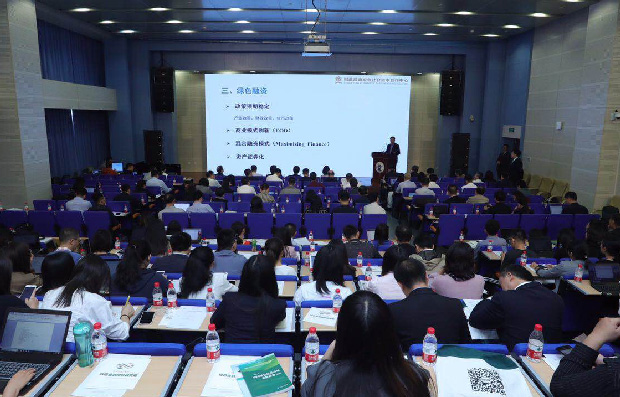


(Photo/provided to People's Daily Online)
Many green finance experts from government departments, academic research and financial institutions attended a meeting focusing on the practical experience and future blueprint of green financial development in Beijing on Sept. 29.
The meeting was held by the International Institute of Green Finance (IIGF) at China's Central University of Finance and Economics (CUFE).
Innovative results were shared in terms of local green finance, green finance cooperation in the Guangdong-Hong Kong-Macao greater bay area, green bonds, ESG, green trade financing and soil restoration, providing professional opinions and forward-facing research for the development of green finance.
During his speech, Shi Jianping, vice president of the CUFE and director of the IIGF, stressed the importance of green finance and praised the work carried out by the institute over the past two years.
Shi continued that he expects more distinctive achievements in various aspects, and a constantly enriched discipline and theoretical system of green finance. He hopes the institute will make a deeper impression going forward.
Wang Linjing, CEO of TF Securities Co., Ltd and director of the Green Securities Committee at the Securities Association of China, introduced the close cooperation between the TF Security and the IIGF. He added that in the future, the committee will continue to integrate the whole securities industry, improve the implementation of green finance, and promote the practical development of green finance.
Ma Jun, a member of the Monetary Policy Committee of China's central bank, expressed that China has included green finance in the 2016 G20 summit to promote it further. The EU has launched the Action Plan: Financing Sustainable Development on March this year, which also shows significant global headway.
"The People's Bank of China has a strong will to promote green finance," Ma stressed in his keynote speech.
Ma said that by the end of 2017, eight central banks including The People's Bank of China, the French Central Bank, and the German Central Bank have established a Central Banks and Supervisors Network on Greening the Financial System. To date, 18 countries are involved.
Reducing the risk weights of green assets could significantly cut the financing cost of green credit and foster banks to increase their efforts, which is in line with the requirements of regulatory policies to ensure the robustness of banks, as well as the general direction of developing green finance, supporting the real economy and promoting its green transformation, Ma noted.
Jiao Xiaoping, director of the China Public-Private Partnerships Center (PPP) at the Ministry of Finance, pointed out that during green development, the government and the market should both play an active role. The decisive role of the market in resource allocation should be emphasized, especially in the process of ecological industrialization and industrial ecologicalization.
Over the past year, with researching as its core, IIGF has published many works, said Wang Yao, dean of the IIGF, adding that they have carried out considerable cooperation with many international organizations including the United Nations Environment Programme (UNEP), International Finance Corporation, European Investment Bank, and more.
 Fire brigade in Shanghai holds group wedding
Fire brigade in Shanghai holds group wedding Tourists enjoy ice sculptures in Datan Town, north China
Tourists enjoy ice sculptures in Datan Town, north China Sunset scenery of Dayan Pagoda in Xi'an
Sunset scenery of Dayan Pagoda in Xi'an Tourists have fun at scenic spot in Nanlong Town, NW China
Tourists have fun at scenic spot in Nanlong Town, NW China Harbin attracts tourists by making best use of ice in winter
Harbin attracts tourists by making best use of ice in winter In pics: FIS Alpine Ski Women's World Cup Slalom
In pics: FIS Alpine Ski Women's World Cup Slalom Black-necked cranes rest at reservoir in Lhunzhub County, Lhasa
Black-necked cranes rest at reservoir in Lhunzhub County, Lhasa China's FAST telescope will be available to foreign scientists in April
China's FAST telescope will be available to foreign scientists in April "She power" plays indispensable role in poverty alleviation
"She power" plays indispensable role in poverty alleviation Top 10 world news events of People's Daily in 2020
Top 10 world news events of People's Daily in 2020 Top 10 China news events of People's Daily in 2020
Top 10 China news events of People's Daily in 2020 Top 10 media buzzwords of 2020
Top 10 media buzzwords of 2020 Year-ender:10 major tourism stories of 2020
Year-ender:10 major tourism stories of 2020 No interference in Venezuelan issues
No interference in Venezuelan issues
 Biz prepares for trade spat
Biz prepares for trade spat
 Broadcasting Continent
Broadcasting Continent Australia wins Chinese CEOs as US loses
Australia wins Chinese CEOs as US loses